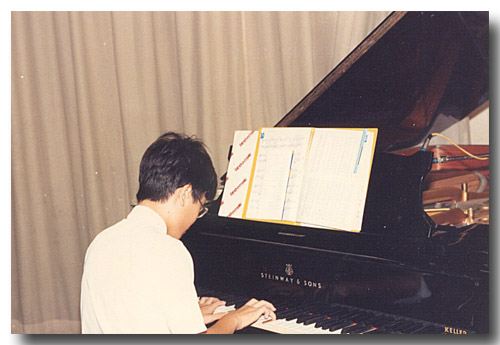 Seeing that Ling’s shared about her experience of learning music, I figured I should put my take on it too.
Seeing that Ling’s shared about her experience of learning music, I figured I should put my take on it too.
Perfect pitch, or absolute pitch, basically refers to the ability to tell a note without a reference note first. So e.g. whenever I hear a piece of music, I can tell immediately what key it’s in, and also accurately replay the melody on the correct key on the piano as well.
blog-cy-piano.jpgWith perfect pitch, I sailed through the aural component of my ABRSM exams every year while studying music (Ling in contrast had big problems – see what she said haha). Sight-reading was also really easy for me. It was sort of funny. I remembered the group aural exam components my music teacher at Grade 8, a Mdm. Ler Hui Siam, got us to do. I was the only boy in the group, and she’d usually tell me to give the poor girls a chance as I was always the first to yell out the interval as soon as she played it.:)
That said, while the ability is pretty rare – apparently as few as 1 in 10,000 persons – it’s not indicative of musical ability. What the girls thoroughly trashed me in were the practical components. Being male, I just didn’t have the same kind of dexterity they had. I was always envious of how beautiful they could play those Clementi, Bach, Mozart and Chopin exam pieces. I barely squeaked through the practical components of each ABRSM exam while the girls were heaping merits and distinctions in every exam. In fact, I was usually the lowest scoring student in my piano teacher’s class!
Still, what I lost in finger agility when it came to the practical component, I managed to somewhat compensate in expression and piece dynamics. At the later grades, I routinely disregarded the Crescendo and Diminuendo markings my piano teacher made for me on my score sheets and went with my own ones, often after hearing the recordings of those examination pieces on my then still small classical music tape collection.
For certain, it’s funny how things turned out. After getting myself really immersed in classical music from the mid 80s onwards, my ambition was to be a professional classical musician. My dreams invariably revolved around playing Mozart’s piano concertos at the concert hall, or singing the part of Figaro from his opera Le Nozze di Figaro. Unfortunately, my parents always and still do regard music-making as an interest and not as a profession that can pay the bills. So, I went with my other continued interest – which was computers – well, the rest of it is history.
All that said, I’m glad that more than 20 years after finishing my grade 8s in Pianoforte and Theory, I’ve returned to playing the piano very occasionally – in our bible study group. OK, so I squirm, hesitate, protest when I’m asked to play – but once (and only when!) the initial fears get overcome, a small part of me feels joy in being able to make music, even if the music-making is not rendered with the same skill as I could muster in the early 90s.
Ann from our small group was asking the other day during a home visit if Ling and I could manage a duet at some time, and that nearly freaked Ling out. But who knows? With enough of that “secret” practices she’s remarked in her entry, perhaps that could become reality at some point.:)
And oh yes; the picture in this entry is one of the only two pictures ever taken of me on the piano. This one was taken during 100th Founder’s Day service at Anglo-Chinese School in 1986.:)
Recent comments